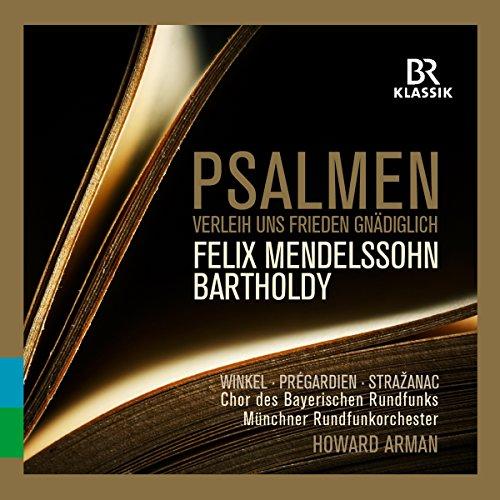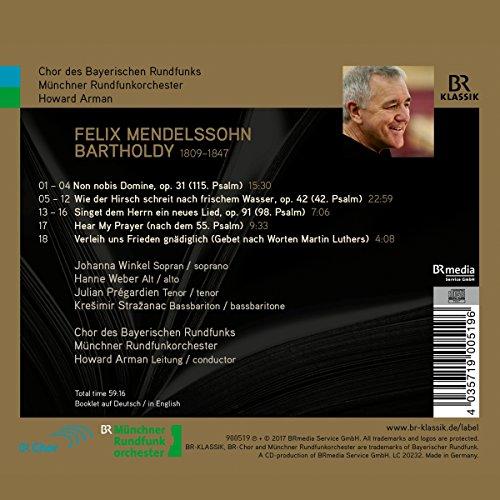Hardly any composer of his era was so deeply rooted in the German and European choral tradition as Felix Mendelssohn Bartholdy. Under the strong impression of the art of Johann Sebastian Bach, which he had got to know at the Berlin Singakademie with Carl Friedrich Zelter, the young man created a series of eight choral cantatas, which also include Verleih uns Frieden gnädlicher (1831) a short prayer for words Martin Luther’s for choir and orchestra, which takes up the text but not the melody of the well-known chorale. Even better known are Mendelssohn’s five broad and large-scale psalm settings, three of which are heard here: The first piece in this group is the multi-part 115th Psalm Non nobis Domine (Not our name, Lord, sung in Latin) for solos, choir and orchestra op 31 (1829/30), which was probably begun during his first stay in England and which proves Mendelssohn’s fascination with Handel’s music. He added the German text in 1835 for the first publication. Wie der Hirsch cries, a multi-part, cantata-like setting of the 42nd Psalm for soprano, choir and orchestra op. 42 (1837/38), Mendelssohn himself considered his best work in this group.It was also highly praised by Robert Schumann and is one to this day of the composer’s most famous choral works. In 1843/44 he wrote, among other things, a setting of the 98th Psalm Singet dem Herrn a new song for soli, choir and orchestra op. 91 for the newly composed Berliner Domchor, and in response to requests from London he created the hymn Hear my Prayer (Hör mein Bitten , sung in English) after the 55th Psalm for soprano, choir and organ (1844/1847), which he later orchestrated and published with English and German text. The organ version was premiered in London and the orchestral version in Dublin; the piece, which takes up the English tradition of the verse anthem, was one of his most famous sacred compositions in Victorian England. In the recording of a concert from the Munich Prinzregententheater on December 17, 2016, the highly acclaimed Bavarian Radio Choir can be heard, supported by the soloists Johanna Winkel, Julian Prégardien and Kreimir Stra anac as well as the Munich Radio Orchestra under the direction of Howard Arman.
Προσφορά!
Psalmen – Verleih uns Frieden gnadiglich (CD, Br-Klassik)
CDOriginal price was: €15.00.€9.75Η τρέχουσα τιμή είναι: €9.75.
Μόνο 1 απομένουν σε απόθεμα
Επιπλέον πληροφορίες
| Record Labels | Br-Klassik |
|---|---|
| Είδος Μουσικής | Classical Music |
| Προέλευση | Europe |
| Format | CD |
Εταιρία
Br-Klassik
Μπορεί επίσης να σας αρέσει…
-
Vinyl Cleaner Alcohol-Free Ready-to-Use 200ml + Microfiber Cloth (Simply Analog)
Αξεσουάρ €10.00 -
12” PVC Εξώφυλλα δίσκων (πακέτο των 25)
Αξεσουάρ €16.95 Quantity Discounts -
Mobile Fidelity Inner Sleeves (pack of 50)
Αξεσουάρ €40.00 -
Simply Analog 12 LP Antistatic Inner Sleeves White (Pack of 25)
Αξεσουάρ €15.95 Quantity Discounts  Επιλογή
Αυτό το προϊόν έχει πολλαπλές παραλλαγές. Οι επιλογές μπορούν να επιλεγούν στη σελίδα του προϊόντος
Επιλογή
Αυτό το προϊόν έχει πολλαπλές παραλλαγές. Οι επιλογές μπορούν να επιλεγούν στη σελίδα του προϊόντος βουρτσάκι Simply Analog από φυσική τρίχα
Αξεσουάρ €18.00-
12” PP (Polypropylene) Εξώφυλλα δίσκων (πακέτο των 25)
Αξεσουάρ €8.95 Quantity Discounts -
Simply Analog 12 LP Antistatic Inner Sleeves Black (Pack of 25)
Αξεσουάρ €15.95 Quantity Discounts -
Gatefold (2 LP) PVC Εξωφυλλα (πακέτο των 10)
Αξεσουάρ €13.90 Quantity Discounts















